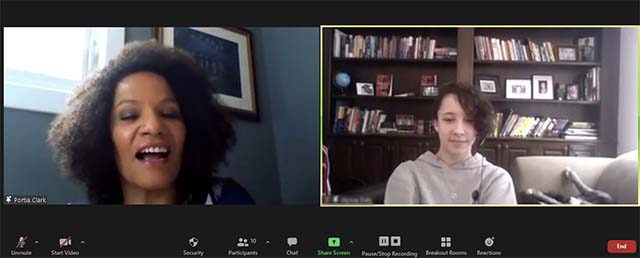Back in 2020 the Canadian Association of Black Journalists (CABJ) launched the first installment of J-School Noire, an educational and mentorship initiative. They started out with a desire to implement programs geared towards young Black people, and to get them into the field of journalism.
“We wanted young people to walk away with what it means to be a journalist,” says Brian Daly, event organizer and CABJ Atlantic director.
The CABJ ended up choosing Halifax as a place to launch their first pilot project—and J-School Noire was born.
This past weekend they encouraged members of the Black community interested in journalism and storytelling to join them in their second series of workshops—hosted in four different cities this year: Halifax, Ottawa, Toronto and Edmonton.
J-School Noire, sponsored by the University of King’s College, saw a lot of success in its first year says Daly, and the CABJ is even working with Yahoo and Google to produce some classes.
Daly says, from the first J-School Noire they learned that a lot of Black youth were already pursuing journalistic projects but they either weren’t aware these pursuits could become a career, or faced barriers getting into the field.
“There are systemic issues that are difficult to solve however there’s increasing awareness that those barriers are real,” says Daly.
Due to pandemic restrictions this year’s workshops were all online via Zoom and took place over a weekend in mid-February.
The event featured various journalists currently in the field who were able to offer insight into journalism as a career. Guests included CBC Radio One host and journalist Portia Clark, News Director for Global Halifax, Rhonda Brown, journalist at Global News, Alexander Quon, writer and broadcaster Shari Okeke as well as journalist Sherri Borden Colley.

Journalist Portia Clark talks with a student over Zoom during the second J-School Noire series.
The weekend began with attendees showing introduction videos they had made for the workshop. Portia Clark then kicked off the first day of programming, getting a conversation started by asking the group “what is journalism?”.
“At its core journalism really is distributing information,” said Clark during the event. “Hopefully in a way that’s interesting for people and they want to watch it because they know it affects their lives or someone they know.”
Station manager Rhonda Brown took those in attendance on a virtual tour of Global Halifax, asking various people at the station about the work that they do. A reporter for Rogers TV, Vincent Williams, spoke next about what it means to do sports journalism, and how exciting it was to cover events like Toronto Raptors basketball games and even the Olympics.
Video journalist Brandon Rowe introduced the workshop participants to some techniques and technological resources used by many working journalists today, including how to work with popular video editing app Adobe Premiere Rush.
The second day got started with a question-and-answer session led by Sherri Borden Colley, BJ(Hons)’97. Colley, who has spoken at King’s in the past and who the university named as its 2020 honorary doctorate recipient, explained what motivates her to speak out and speak at events like J-School Noire:
“I want to see more Black journalists and I want students to know that they too can succeed in this field.” said Borden Colley.
Shari Okeke, creator of “Mic Drop”—an award-winning podcast which encourages teens to share personal and relatable stories—offered some information on what it takes to make a documentary. The day wrapped with workshop attendees sharing their thoughts about J-School Noire, with some saying they were excited and thankful for the workshop.
Daly hopes that doing workshops like J-School Noire will help address the racial disparities that exist within the field, and the lack of young Black people entering a journalism career.
Daly says CABJ is already working on J-School Noire 2022 and hopes it will be an in-person event.
“We’re really happy and grateful that our sponsors are not just in it for one year at a time,” says Daly. “We’ve been very blessed at the CABJ that we do have multi-year deals and are continuing to negotiate for even more multi-year deals for programs like J-School Noire.”
Photos shared with subjects’ permission, courtesy of the Canadian Association of Black Journalists.

